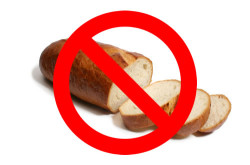CLL and the Wheat-Free Diet
Posted by: Denise on: October 28, 2015
 This is a guest post by Eric Clark, a fellow CLL manager who has graciously offered to write on his like-minded thoughts for this web site:
This is a guest post by Eric Clark, a fellow CLL manager who has graciously offered to write on his like-minded thoughts for this web site:
Wheat-Less Wisdom – #1
As Humans – Homo Sapiens – we have evolved uniquely over the past 2.5 million years distinguished initially by our use of fire to cook meat. For most of that time we moved around, on foot, looking for and chasing our food. We did not eat three meals a day and often had very little food for a few days at a time. Our ‘snacks’ were berries, nuts and wild vegetables(tubers) while hunting for fresh meat. Eating the seeds of grasses – what we call grains – was a desperate measure in times when starvation threatened. We have only done this for 10,000 years, just 0.4% of our recent evolution!
Eating is an expression of individual survival. Sharing meals is a culturally-rich activity. Food is an emotional topic. Our choices are rarely based on true health science. When one decides to return to wheat-free living, it can be a very lonely choice. Institutions in key areas such as medicine, public health, education and the media do not support this choice. In fact, they seem to argue against it. And the many organizations that have formed around various major diseases have all determined that ‘healthy whole grains’ represent an essential component of healthy living.
During the past 50 years grain consumption has increased, as have a long list of degenerative conditions. The science that has demonstrated the direct link between the two has not been featured in a way that would seriously challenge this mass consumption of a food source that is more suited to 4-footed grazers with very different digestive systems. A study of various indigenous peoples around the world reinforces what science has discovered and yet we rarely learn from humans who are considered less ‘advanced’ than ourselves. Although we can boast to be living longer than even our recent ancestors, our quality of life may be severely compromised by several conditions that are described as ‘normal aging’. There is no easy justification for conditions that are occurring earlier in life such as obesity and diabetes.
Our so-called health care is really a disease management system which too many have come to rely on as their quality of life declines. The focus is on finding ‘a cure’ rather than addressing the contributing factors that are within our control. To some, the idea that our basic diet may be the culprit is just too simple to be the answer to these complex conditions. We have handed over our power in other ways so how could we know better than the brightest minds in medicine and food science? Is this just an excuse for not trying something as simple as a dietary change for a few weeks? As that famous line from Pogo says, “ We have seen the enemy, and the enemy is us! †Eric Clark – strategy9@icloud.com